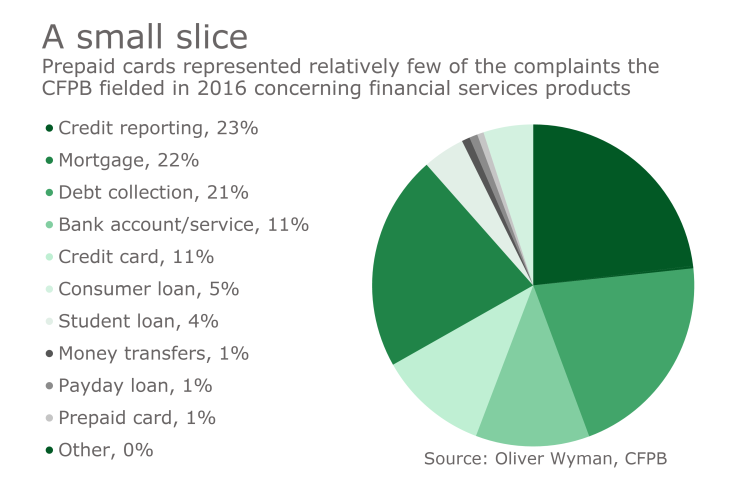The prepaid card industry saw strong growth during the economic downturn, when millions of consumers shut out of traditional banking channels piled into a payments niche that provided easy access with minimal federal protections.
The CFPB took notice, and several years ago announced plans to introduce formal rules to protect consumers from unfair and deceptive practices in the market. Many prepaid card companies asserted that they were already in compliance with the spirit of this plan, but last fall when the CFPB finally weighed in, its dense final rule exceeded 1,600 pages and contained some surprises.
Compliance will require many prepaid card issuers to make substantial changes in packaging, marketing, cardholder agreements and technology platforms by October 1, 2017, said Brad Fauss, president and CEO of the Network Branded Prepaid Card Association (NBPCA), which represents the industry in Washington, D.C. Meeting this deadline could be “a nearly insurmountable task” for some prepaid card issuers because of the scope of the changes, he said.
“The prepaid card industry waited nearly four years for the final rules, but what we received was so lengthy and complex that it took many prepaid issuers more than two months to simply digest the rules’ content, prior to comparing the new requirements to their existing prepaid account products,” Fauss said.

The CFPB said its
An extreme example of this was the ill-fated Kardashian Kard, promoted by the Kardashian sisters as a VIP prepaid card. Though its monthly fees were in line with other prepaid cards of the time, the Kardashian Kard asked for six to 12 months' worth of fees up front, leading many to call it exploitative. The media backlash
In light of PR disasters like the Kardashian Kard and more recent moves from regulators, prepaid card issuers already had taken steps to ensure broad consumer protections, but certain provisions of the CFPB’s new rule—such as the expansion of limited liability for unregistered prepaid accounts—create unexpected new legal conundrums for issuers, according to Fauss. To avoid possible exposure to lawsuits, some issuers may see the need to remove and replace prepaid cards from store shelves prior to the CFPB's deadline, Fauss warned.
The NPBCA has begun discussions with the CFPB to try to win an extension to the required implementation date, which could buy issuers more time to make changes to avoid that legal exposure, he said.
“We’re hopeful the CFPB will extend the implementation period for this complex final rule to avoid a situation where consumers may be unable to purchase reloadable prepaid cards at retail,” Fauss said.
The CFPB hasn’t signaled its position on postponing the rule’s effective date, but the bureau recently hinted there could be wiggle room for prepaid card issuers with the new rules.
At an American Bar Association conference this month in Carlsbad, Calif., the CFPB’s Kristine Andreassen told attendees the bureau’s prepaid rules “are never set in stone,” indicating changes might come through informal guidance or a formal rule-modification, according to law firm Ballard Spahr's
Hopes for a broad rollback of the CFPB’s new prepaid rule are dim. Some experts say that even if President Trump shakes things up at the CFPB, it’s unlikely this would change the prepaid card rule's trajectory, given the complexity of rule-making and that fact that the new rule expands Regulation E coverage to many more prepaid card products.
“With the complexity surrounding Reg E and time needed for proposed rulemaking and comments, prepaid issuers should accept the fact that they will be locked into the current course for the year,” said Ben Jackson, director of prepaid cards at Mercator Advisory Group. “The prepaid rule also is not likely to be at the top of the list of other rules lawmakers are hoping to have overturned."
The CFPB would need to act fast to create a meaningful deadline extension for the prepaid industry, according to Fauss. The NBPCA estimates that prepaid card issuers under the gun to redesign card product features, update cardholder agreements and card packaging materials would need to begin production on those materials within the next 30-45 days to get new products on shelves by next Oct. 1.
Prepaid issuing giant Green Dot Corp.’s CEO Steve Streit told analysts last fall when discussing quarterly earnings that he expects the company to experience some “implementation hiccups,” but Green Dot has since remained mum on whether they will struggle to make the Oct. 1 deadline.
The Bancorp, a leading issuer through more than 100 partnerships and 88 million prepaid cards in circulation, is working with its program partners to meet the Oct. 1 compliance deadline but said it will take considerable effort.
"An extended compliance date would provide the industry additional planning time and minimize potential consumer disruptions in the event that product changes are required," said Jeremy Kuiper, senior vice president and managing director of payment solutions for Wilmington, Del.-based Bancorp.
Though The Bancorp doesn't anticipate making major product changes yet, the CFPB's rule extending Reg E to unverified prepaid cards may require some changes to prepaid cards' functionality, Kuiper added.
Operational changes prepaid card marketers may need to make to comply with new CFPB rules could be complex, said Eli Rosenberg, an associate at law firm Baird Holm LLP Beginning this year, prepaid card marketers must provide up to 12 months of electronic transaction history and 24 months of written account history upon request, compared to a common practice of providing only 60 days of account history to cardholders who request it, Rosenberg said.
“The final rule allows for the exhaustion of current inventory on retail shelves, but providers have been actively looking at whether they may still have to pull and replace card packaging and materials (to avoid exposure to lawsuits) which could require a longer implementation period,” Rosenberg said.
Prepaid products covered under the CFPB rule include general-purpose reloadable cards, payroll cards, government benefit cards, non-reloadable prepaid cards, open-loop mobile wallets that store funds, ATM-only cards, bill payment accounts, P-to-P and B-to-C remittance accounts.
Gift cards, promotional cards and a narrow range of health care, employee benefit, disaster relief and some state and local benefit cards are excluded from the new rules.
Consumer advocates who have been closely tracking the prepaid card industry for years are less sympathetic to the dilemma issuers face in updating products before the new rules take effect.
“Everyone recognizes that changes take time, but October is a long way off and the CFPB expects companies to meet reasonable deadlines,” said Lauren Saunders, an associate with the National Consumer Law Center.





